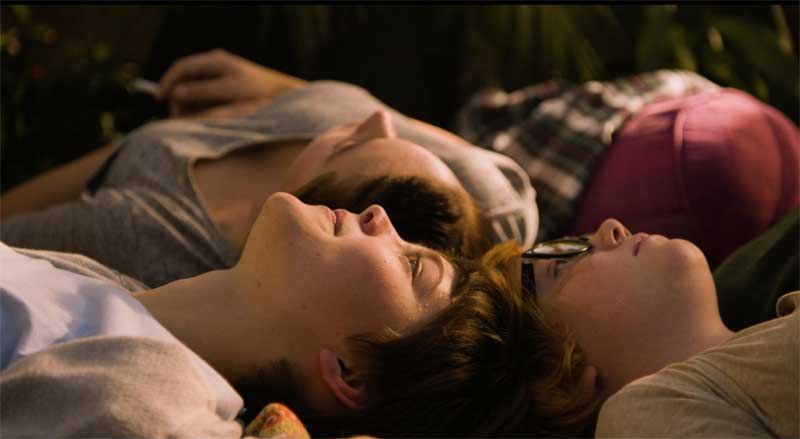Watching Girls Lost (Pojkarna in the original Swedish) makes me wish I had all that education film critics have. That way I might understand all the Swedishness of this film with its strange symbolism, magical thinking, and morose ending. Beware the spoilers.
For the first 10 minutes of the film, I kept yelling, “This is weird,” at my TV. After a while, the amount of symbolic material gave way to straight storytelling and I didn’t have such an impulse to quit watching.
Girls Lost is about gender identity. It’s mixed up with a lot of storylines about bullying, sexual orientation, and high school angst. At its center is Kim (Tuva Jagell as a girl, Emrik Öhlander as a boy), who feels misgendered as a girl and longs to be a boy.
Kim and her friends Momo (Louise Nyvall as a girl, Alexander Gustavsson as a boy) and Bella (Wilma Holmén as a girl, Vilgot Ostwald Vesterlund as a boy) receive a mysterious seed. When they plant it, a black flower immediately grows. The flower oozes nectar – enough to drink – and attracts multitudes of black butterflies. When they drink the nectar, they metamorphosize into boys.
Kim never wants to go back to being a girl. He finally feels right with his body. As a boy he can go to school and not be bullied, play on the team and score points, run wild all night with the school bad boy Tony (Mandus Berg).
For Bella and Momo, the experience is interesting but not something they want to make permanent. Sexual fluidity and orientation enters the story as the 3 friends drink the flower’s nectar again and again. Momo loves Kim, who will kiss her when Kim is a boy and Momo is a girl. No such luck when they are both female. The male Kim is also sexually attracted to Tony, who tries to deny his attraction to a boy.
The friendship between the three friends is torn apart by the shifting roles. Momo destroys the flower. Kim is devastated beyond all hope.
If you wanted to tell the story of someone who wants to transition to a different gender but can’t find a way and lives in misery, this was a good way to tell the story. Hope for some magic, but when it doesn’t come, give up.
If you wanted to tell the story of one teen who finds a way to struggle through the mire of gender identity into something that works, Girls Lost didn’t do it for me. I wanted a more perceptive parent for Kim. Better teachers who actually supported students. A society not so moored in the dark.
I wanted Kim to be Kim – one person – whether identified as male or female. Tuva Jagell should have been the only Kim.
Alexandra-Therese Keining wrote and directed Girls Lost. She also wrote and directed Kiss Me, which I thought was very good. Her score is 1:1 with me right now, which means I’ll be watching her next film with great interest.
My negative feelings about this film put me in a minority. It’s had good reviews. I’d love to know your reaction to Girls Lost. Have you seen it?

Leave a Reply